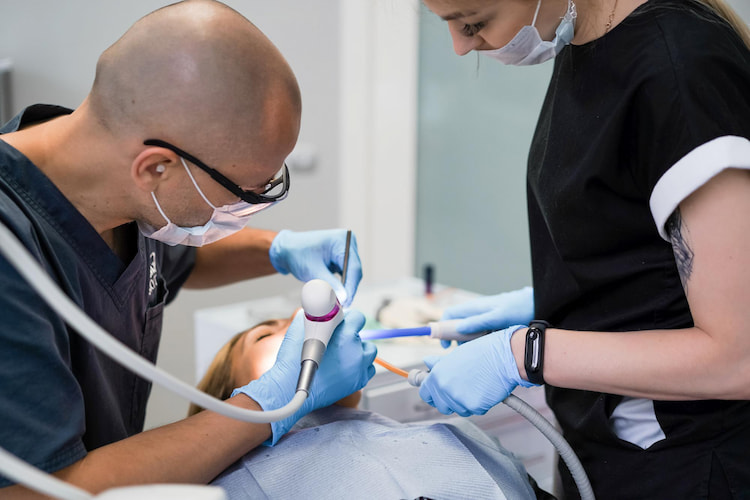The CDCP is one of the most important healthcare initiatives introduced in Canada, aiming to make dental care accessible and affordable for millions of residents who previously had little or no coverage. Naturally, many patients want to know whether the Canadian Dental Care Plan (CDCP) covers crowns, root canals, and dentures. These treatments are often costly, yet they are essential for oral health and function.
In this article, we’ll walk you through CDCP coverage for crowns, root canals and dentures, as well as the requirements you need to meet, the frequency limits, and the exclusions you should be aware of. We’ll also explain how costs and co-payments are calculated and how to apply for this plan.
Does CDCP Cover Crowns, Root Canals, and Dentures?
Yes, the CDCP provides coverage for these services, but with specific rules, requirements, and limits. Coverage is divided into categories: endodontic services (like root canals), restorative services (like crowns), and prosthodontic services (like dentures). Each comes with its own eligibility criteria, preauthorization requirements, and frequency limits.
CDCP Coverage for Root Canals or Endodontic Services
The CDCP covers a range of endodontic services, but not every tooth or situation is eligible. Standard root canal therapy, pulpectomy, root canal re-treatment, and surgical procedures like an apicoectomy may be covered if the tooth is deemed functional and restorable.
According to the tooth restorability criteria CDCP, the tooth must be healthy enough to support long-term restoration. For example, a molar with extensive decay and poor prognosis may not qualify for treatment coverage.
Many endodontic treatments require preauthorization or prior authorization from Sun Life. This ensures that only medically necessary and functionally justified cases are approved.
If you’ve just had root canal treatment or are planning to get one, make sure you check our root canal aftercare guide to get the best results.

CDCP Coverage for Crowns
Dental crowns fall under restorative services, and coverage is often subject to strict eligibility rules. The plan may cover different types of crowns, including cast metal crowns, porcelain-fused-to-metal crowns, ceramic crowns, and porcelain crowns. However, cosmetic-only crowns are excluded.
Crowns must be required for functional reasons, such as protecting a tooth after a root canal or severe fracture. Cosmetic use, such as changing tooth appearance, does not qualify. Furthermore, the plan typically allows one crown per eligible tooth within a set time frame (for example, one crown every 96 months). Exceeding this limit requires special authorization.
As with root canals, crowns usually require preauthorization for CDCP restorative services to ensure they are clinically necessary.
CDCP Coverage for Dentures
Dentures fall under prosthodontic services and are covered, but with conditions. The CDCP includes complete dentures, partial dentures, and overdentures. Complete dentures replace all teeth in an arch, while partials replace a few missing teeth and rely on remaining teeth for support. Coverage also includes denture maintenance, such as denture relines and denture rebases, which extend the life of existing dentures.
Like crowns, denture replacement is subject to frequency limits and may require prior authorization. For example, dentures may only be replaced every 60 to 96 months unless a significant clinical reason is provided.

Contact Us for CDCP-Supported Dental Services!
At Walk-In Dental Clinic, we proudly provide dental care through the Canadian Dental Care Plan (CDCP). Whether you need dentures, crowns, or a root canal, our team will guide you through your CDCP coverage and make sure you get the treatment you deserve. Book your appointment today and let us help you maximize your benefits.
Costs, Co-Payments & Income Thresholds
The amount CDCP pays depends on your adjusted family net income. This is where CDCP income thresholds come into play. Let’s check the coverage based on income.
| Adjusted Family Net Income | Coverage Level | Co-Payment Levels |
| $70,000 or less | 100% covered | No co-payment |
| $70,001 – $79,999 | 60% covered | 40% co-payment |
| $80,000 – $89,999 | 40% covered | 60% co-payment |
| $90,000+ | Not eligible | N/A |
Even with coverage, patients may face extra charges, especially for lab fees or when dentists’ fees exceed the CDCP’s fixed rate schedule. Therefore, always confirm with your provider if additional costs apply before starting treatment.
Read more: Canadian Dental Care Plan for Adults
What’s Not Covered by the CDCP?
Like any insurance program, CDCP has exclusions. These are important to understand before assuming you’re fully covered. Treatments such as dental veneers, whitening, or purely cosmetic crowns are not covered. This is one of the main exclusions under CDCP dental benefits. Moreover, at this stage, implants and implant-supported restorations are excluded.
It’s also worth noting that coverage may be denied if a tooth fails the tooth restorability criteria, CDCP, or if there is untreated gum disease, making the procedure ineffective.

How to Apply & Find Out If You’re Eligible
The CDCP is administered by Sun Life, and applying is straightforward if you meet the requirements. The first step before applying is to check your eligibility. According to Canada.ca, these criteria include no access to any form of dental insurance, adjusted family net income below the threshold (commonly $90,000), Canadian resident for tax purposes, and you must have filed your taxes for the previous year. Then, take the following steps:
- Gather the required documents, including SIN, date of birth, proof of income (CRA notice of assessment), and address.
- Apply online through the Government of Canada / Service Canada website, or by phone if needed.
- Submit the application by providing accurate details and required documents.
- You’ll receive a confirmation letter with the coverage start date.
- Getting a welcome package from Sun Life with your member info.
- Choose a provider who accepts CDCP and book your appointment.
Learn more about the ins and outs of CDCP coverage here: A Comprehensive Overview of Canadian Dental Care Plan Coverage
Enjoy Better Dental Health Using CDCP Coverage for Crowns, Root Canals, & Dentures
The CDCP offers essential coverage for costly procedures like crowns, root canal treatments, and dentures, but understanding eligibility, frequency limits, exclusions, and co-payment rules is key. If you’re wondering, “Does CDCP cover root canal treatments?” or “Are my dentures covered under CDCP?”, the answer is yes, but only within the program’s criteria.
At Walk-In Dental Clinic, we offer various types of dental services through the CDCP in North York. We also make sure you get the treatment you need while making the most of your coverage. Reach out today to schedule an appointment and let us guide you through the process.
FAQ
-
Does CDCP cover ceramic crowns?
Yes, CDCP covers functional crowns, including ceramic crowns and porcelain-fused-to-metal crowns, if they’re required to restore a tooth’s health and strength. However, coverage is not granted for purely cosmetic purposes, such as changing the color or shape of a tooth.
-
How often do crowns need pre-authorization?
Most crowns under CDCP require prior authorization before your dentist can proceed. The plan has strict frequency limitations, typically, one crown per eligible tooth within a set timeframe (such as once every 96 months).
-
Are full dentures included under CDCP?
Yes. CDCP includes coverage for complete dentures, partial dentures, and even overdentures. This coverage isn’t unlimited, though; replacement dentures are usually covered once every several years (for example, every 60 to 96 months).
-
Will root canal retreatment be paid?
Yes, CDCP covers root canal retreatment if it is clinically necessary and the tooth is considered restorable. Your dentist must show that the tooth meets CDCP’s restorability criteria and submit the case for preauthorization. Complex procedures such as apicoectomies may also be covered if standard retreatment isn’t possible, but these, too, require prior approval.
-
What co-pay am I responsible for?
Your co-pay depends on your adjusted family net income. If your household income is under $70,000, you pay nothing; the plan covers 100%. Between $70,001 and $79,999, you’ll pay 40%. Between $80,000 and $89,999, your co-pay rises to 60%. Households earning $90,000 or more are not eligible for CDCP.
Have questions or experiences with CDCP coverage? Share your thoughts in the comments below; we’d love to hear your story and help others navigate their journey!




